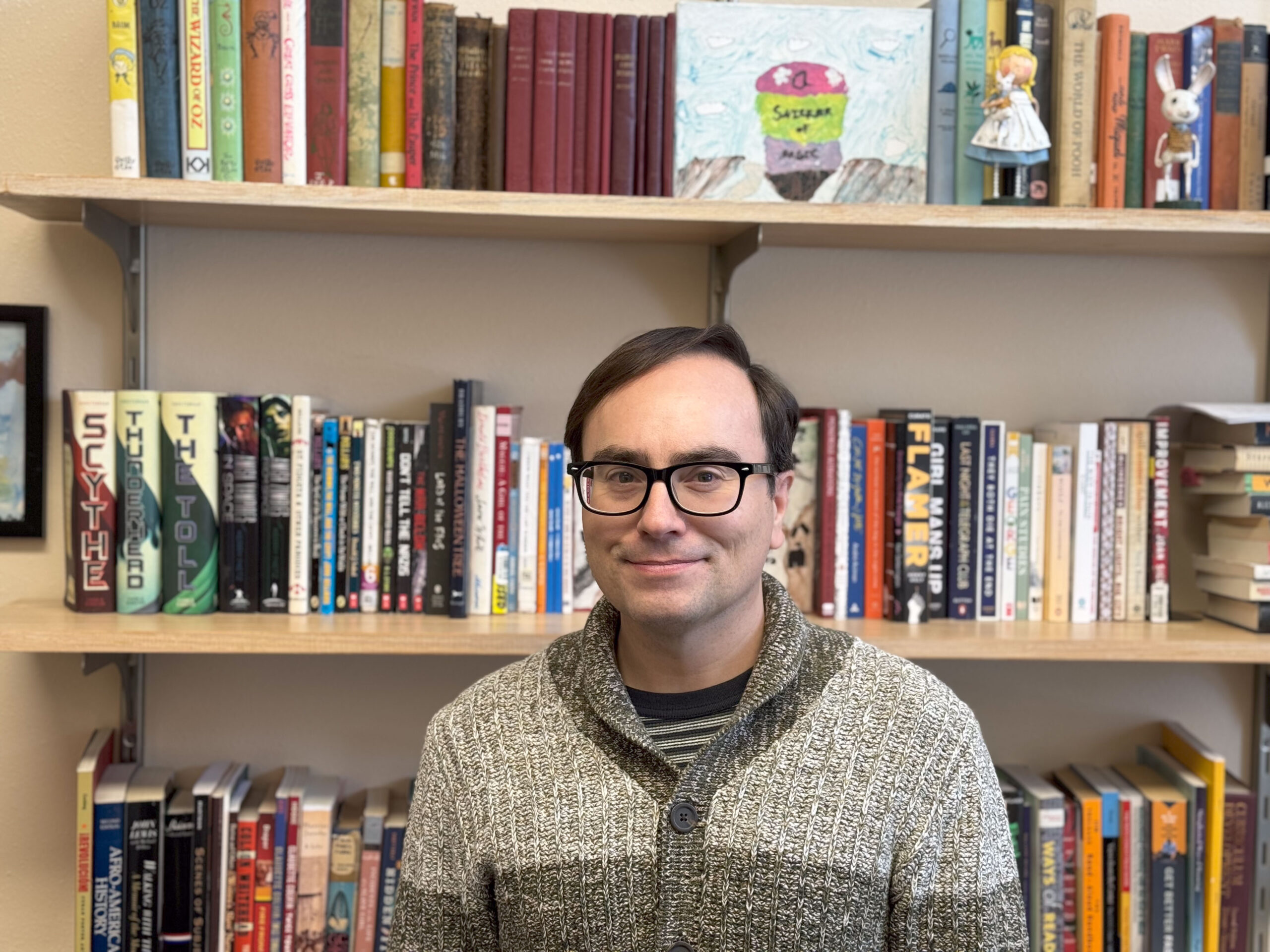A penguin drawing with a scarf hangs in front of Roy Jackson’s desk. With a smile, he shares, “I have this thing for penguins; a student made this for me.”
Adjacent to it is a colorful rendering of a skyscraper: “This student always titled their artwork … I save everything: every little picture, every note.”An Atlanta, Georgia, native, Jackson works in Church-Chapel 115E in the education department. His room is decorated with student artwork and photo collages.
Jackson studied English at Western Michigan University, focusing on literature, creative writing and philosophy. His initial aspiration to become a college professor changed while substitute teaching.
“I thought, well, maybe I’ll be a high school teacher,” he said. “And then I did a long-term substitute position in an elementary classroom and was fascinated by the reading process and how kids learn to read.”
In 1996, Jackson obtained a master’s in education from Aquinas College and eventually taught first grade in Kalamazoo. He later transitioned to urban education, dedicating over 20 years to teaching with the Atlanta Public Schools.
After completing his MFA in creative writing, Jackson sought a new direction, acknowledging the need for a paradigm shift in his career by beginning to work full-time.
“Like so many of us, the pandemic changed things. For me, it was a priority for my family. I wanted to move closer to my mother in Kalamazoo,” he said. “However, I wanted a change regarding education and was searching for positions in higher education instead of K-12.”
During his MFA, Jackson taught at his university and as an adjunct at small liberal arts colleges. He discovered a “renewed energy and enthusiasm for teaching and a challenge with a new age group.”
“I put a pin in a map and saw a posting for GC seeking someone with a background in elementary teaching and a strength in literacy.”
A desire for change and practical considerations influenced the transition from elementary education to high school and college.
Jackson recounted with laughter how his “knees gave out” and that “you can only stay in K-12 so long because you’re always on the floor or on your feet.”
“I thought higher ed would be a good fit for me,” he added. “The last 15 years of my public school experience always involved interns and student teachers. I loved it.”
Jackson loves building meaningful relationships with students and those around him. “I’m always wanting to know where students have wound up.”
Jackson recalls many moments, such as when a former student recognized him at a grocery store.
“I felt a tap on my shoulder and this adult male said, ‘Are you Mr. Jackson? You were my first-grade teacher.’ I smiled and said it was nice to see him again, and stewed over my tough workday.”
“Then I thought, no, that’s not how this story goes. I left my cart in the aisle and found him outside. I said we needed to redo this encounter. I needed to hear his story and he told me of his life.”
The student’s genuine joy and connection left a lasting impact. His commitment to building connections allowed Jackson to learn about the student’s career as a sound engineer.
Jackson also emphasized the significance of his identity within schools as a member of the LGBTQ community.
“I believe that my presence as a queer American mattered in my schools,” he said. “By being out at work, it made space for queer families to see someone like them. This was before marriage equality, so non-birth parents weren’t always welcomed in schools, certainly not legally. However, those fearful hopefully saw that my openness and boldness to be out made them feel at ease. That as queer parents, they would be accepted.
“I also hope it helped prevent kids from learning to discriminate against queer people. Kids aren’t born to discriminate: they learn it. However, it works both ways. If they learned I was queer, had a same-sex partner, and I was a good person in their life, it would make it harder on a larger scale to adopt discrimination towards other queer people.”
In terms of his schooling, Jackson faced challenges during high school, ultimately leading to his decision to drop out because of a “pretty miserable” senior year.
“It took a lot of bullying,” he said. “They were not interested in protecting students, students of color, immigrant students, or queer students.”
Jackson ended up pursuing his education through correspondence courses akin to online learning. Addressing the common question about why he entered education despite his struggles, he said, “When you have a bad experience, you go into an industry to make it better for others.”
Jackson believes the current education system has work to do as well, noting one of the most challenging parts is “the declining respect of the profession.”
“I can’t wrap my head around this lack of trust towards the profession currently that seems somewhat pervasive nationwide. There is a national sentiment that seems not to trust teachers right now.”
Beyond the classroom, Jackson enjoys running, yoga and tennis, which he prioritizes in that order. Jackson also loves attending live concerts, often going solo without hesitation. “If I want to go to a show in Atlanta and no one can go with me, I’m going to go,” he said. “I’m not going to miss this band whose music I enjoy.”
Amidst sharing his hobbies, Jackson candidly shared the hurdles of residing in a separate state from his husband and their dog, who currently live in Pennsylvania.
“It’s hard,” Jackson said when discussing living five hours from his husband. “Geography played an important role when applying for jobs. But as a partnership in life, we decided this was the right move to come to GC for several reasons. I will also say this: Because we are apart, it makes our time together so meaningful. We make that time count. We are dating again in some respect and that is fun.”
As a parting piece of advice, Jackson jokingly urges individuals to “find somebody really good with money to take advice from because I’m not that person.”
On a serious note, he emphasizes balancing personal and work life. Reflecting on his journey, he said, “I look back at how much time I devoted to work at a cost to my personal life and people I love.”
“I don’t mean this to sound callous, but we’re all immensely replaceable at work, right? I can’t reclaim time with my mother, who’s getting older, or time with people I love. I wish I had balanced work and life better.”
Jackson also underscored the importance of prioritizing mental health, especially for current and future teachers.
“I left teaching with two years worth of sick days that I never used,” he said. “That’s very common. And that’s not okay. I implore teachers today to use their days. Work will survive without you. Take care of yourself.”




